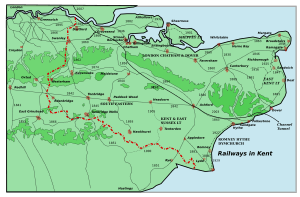Connex South Eastern facts for kids
| Franchise(s): | South Eastern 13 October 1996 – 8 November 2003 |
|---|---|
| Main {{{nameforarea}}}(s): | Greater London, Kent |
| Other {{{nameforarea}}}(s): | East Sussex, West Sussex, Surrey |
| Fleet size: | approximately 350 |
| Stations called at: | 178 |
| National Rail abbreviation: | CX |
| Parent company: | Connex |
Connex South Eastern was a company that ran trains in the United Kingdom. It was owned by a larger company called Connex. From October 1996 to November 2003, Connex South Eastern was in charge of the train services in the South Eastern part of England. This area included places like Greater London and Kent.
A "train operating company" is a business that runs passenger trains on specific routes. They get a special agreement, called a "franchise," from the government. This agreement lets them operate trains for a certain number of years.
Connex South Eastern's services eventually stopped. This happened because the company faced money problems. They also used older trains instead of buying newer ones, which caused issues. After Connex South Eastern, another company called South Eastern Trains took over the routes.
Contents
What Was Connex South Eastern?
Connex South Eastern was one of many private companies that started running trains in the UK in the 1990s. Before this, all trains were run by a single government-owned company called British Rail. When British Rail was split up, different companies took over different parts of the railway. Connex South Eastern won the right to operate the South Eastern routes.
Where Did Connex South Eastern Operate?
The company ran trains mainly in the south-east of England. Their services connected many towns and cities in Kent and East Sussex with London. They operated trains on 178 different stations. This meant they served a large number of daily commuters and other passengers.
The Trains They Used
Connex South Eastern used a fleet of around 350 trains. Many of these trains were older models that had been used by British Rail. While some new trains were introduced, the company often relied on these older models. This became a problem as passengers wanted more modern and reliable services.
-
Class 423 at Waterloo East on 8 February 2003
-
An ex Connex Class 466 at Blackfriars in 2006.
Why Connex South Eastern Stopped
Connex South Eastern's contract to run trains ended in November 2003. The government decided not to renew their franchise. This was mainly due to the company's financial difficulties and issues with how they managed their services.
Financial Problems
Running a train company is very expensive. Connex South Eastern struggled to make enough money to cover its costs. This led to problems with maintaining trains and providing the best service.
Old Trains and Service Issues
Passengers often complained about the older trains and the quality of service. When trains are old, they can break down more often. This causes delays and makes journeys less comfortable for passengers. The government wanted to see better, more reliable services for people in the South East.
What Happened Next?
After Connex South Eastern, a new company called South Eastern Trains took over the services. This company was actually set up by the government for a short time. Later, another private company won the franchise to run the trains in the South East. This shows how the railway system in the UK has changed over time, with different companies taking turns to operate the services.
 | Kyle Baker |
 | Joseph Yoakum |
 | Laura Wheeler Waring |
 | Henry Ossawa Tanner |




